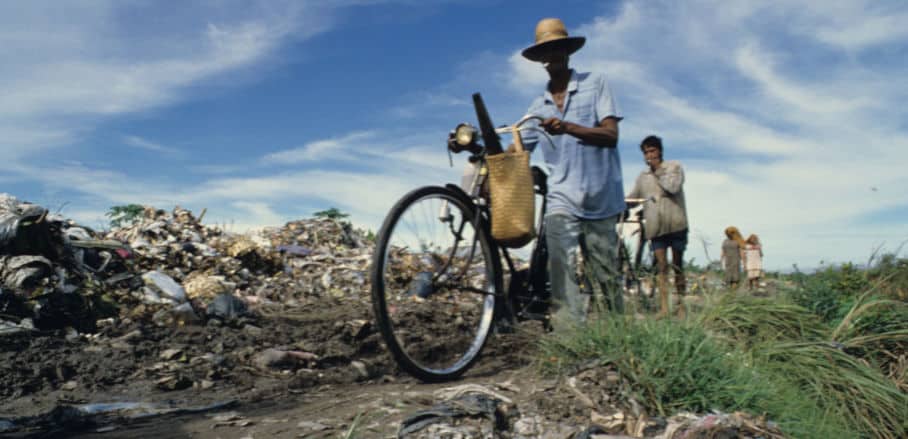Are Environmental Protections Leaving Social Security Behind?
Climate change exacerbates inequality while inequality exacerbates climate change. So, how can we break free from this cycle that disproportionately harms those communities that contribute the least to climate change, Taylor Cass Talbott asks.
In a time defined by turbulent change and polycrisis – climate change, disposability, and artificial intelligence – one constant is that environmental degradation like pollution and climate change disproportionately harm those communities that have contributed but a fraction of, or even help mitigate, global emissions. As policy responses also continue to cause more harm, a climate apartheid looms for communities most vulnerable to climate change. A global green transition is desperately needed but will only be possible if environmental and social objectives are finally pursued together.
Climate change magnifies inequality, and yet inequality has also shown to accelerate GHG emissions and climate change. Consequently, the excessive emission of greenhouse gasses can be seen as a form of wealth extraction, necessitating environmental policy that is both, economically reparative and distributive.
A Green Transition for Who?
However, the reality has too often shown the opposite. Green investments can reduce affordability, they can also increase the value and desirability of properties. Thus, they are reinforcing existing social and environmental inequalities or even creating new ones.
Take, for example, the exclusive financial capture of urban greening opportunities by the elite, which generates a range of injustices. Climate change policies implemented in those areas have shown to harm low-income communities. They drive up the cost of energy, transportation, and consumption, displacing workers in polluting industries and constraining the utilization of natural resources. Moreover, they can diminish public funding for social protections, intensifying the struggle for those already marginalised.
The impact on workers in the informal economy can be particularly bleak, especially for waste pickers often on the front lines of dispossession. Climate-motivated policies, such as the closure of open dumpsites, often displace waste pickers and other workers there, without safeguarding their livelihoods. Circular economy efforts, like the implementation of doorstep recyclables collection and Extended Producer Responsibility policies often divert materials away from waste pickers and other less powerful waste management actors. Moreover, they not also amplify competition for materials that leave the most precarious workers excluded and but also tend to create significant barriers to continued work in the sector.
Just Transition as a Pathway to Environmental and Social Justice
In response to the challenges posed by green transition policies, affected workers, environmental justice groups, trade unions and other workers organisations have rallied behind the concept of a just transition. This transition aims to make the shift to a greener economy fair and inclusive for everyone. It’s about confronting the historical and persistent effects of pollution on frontline communities, while also creating decent work opportunities and ensuring that no one is left behind.
As inequality and climate change are both on the rise, the importance of just transition is now more urgent than ever. The good news is, labor and environmental justice groups are actively incorporating just transition approaches into global processes like the climate COPs, the International Labor Conferences and the UN Plastics Treaty
Starting a Just Transition Today
The key to just transition is social protection- measures like labor market interventions, social insurance and social assistance that enable workers to navigate economic disruption. Ideally, those measures should also influence the labor market to accommodate the needs of society’s most precarious workers. Without adequate and universal social protection and safety nets, it’s impossible to imagine a world in which nobody is left behind.
And yet a recent analysis of countries’ pledges to mitigate and adapt to climate change in 2021 revealed a glaring gap. Only 11 per cent mentioned social protection, with even fewer proposing measures to strengthen social protection systems, and just two per cent referenced a just transition.
The critical role of formal and informal workers organisations cannot be overstated. They actively push for the integration of socio-economic issues within environmental policy, and work to secure social protections and a just transition for their members. Organising has shown to strengthen worker resilience during times of economic and climate disruption.
Involvement in climate policy processes also helps workers’ organisations to anticipate and navigate impending disruptions to their sector. This underscores why they should be actively involved in the crafting, implementation and monitoring of green policies.
The world economy is riddled with profound structural injustices where climate change and inequality are both linked and rising. Only by de-linking inequality and climate change, through universal social protections and legal mandates for inclusive social dialogue and a just transition, can we break this cycle. The time for action is long overdue, but we can still start today.
- Are Environmental Protections Leaving Social Security Behind? - 6. February 2024
